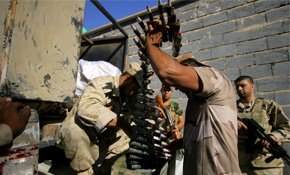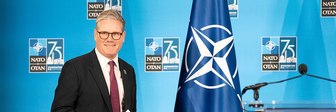John Humphrys asks: How far should Britain go in comitting itself to the destruction of IS?
Parliament is being recalled on Friday and by the time you read this it is pretty much certain that MPs will have voted to back David Cameron’s call for Britain to ‘play its part’ in military action to turn back the advance of Islamic State in the Middle East and ultimately to destroy the power of the brutal jihadists who have caused such suffering in the region. RAF planes could be bombing targets in Iraq as soon as this weekend. But how far should Britain go in the long run to commit itself to the destruction of IS and the broader scourge of extreme Islamic terrorism not only in the Middle East but elsewhere in the world?
The Prime Minister, speaking to the General Assembly of the United Nations in New York on Wednesday, described IS as an ‘evil against which the whole world must unite’. He said he wanted Britain to play its part in the military campaign that has already begun, with a US-led coalition of states, including not only the French, but also countries in the region, such as Saudi Arabia and the United Arab Emirates, already engaging in bombing raids on IS targets in both Iraq and Syria.
David Cameron has been careful to avoid the embarrassment he suffered this time last year when he sought parliamentary approval for military action against the Assad regime in Syria only to be defeated by the Labour opposition and rebels on his own benches. This time round he seems to have succeeded in getting them on board before the Commons’ debate begins.
Speaking about the IS threat, Ed Miliband, the Labour leader, said at his party’s conference this week: ‘I don’t think we can turn away’. And the former Liberal Democrat leader, Lord Ashdown, was even more supportive on the Today programme on Thursday. He told me: ‘There is a convulsion of barbarity in the Middle East. It is changing the borders, destabilising states and could lead to a regional war – there is a great danger of that. It certainly threatens the stability of our nations in the west.’
So it seems a done deal. But the plan is, necessarily, very limited. It will be restricted to joining in air strikes on IS targets in Iraq. The Prime Minister made clear that he believed there was a watertight legal basis for such action because the Iraqi government itself had asked the British to join in such action against the forces fighting against the Iraqi state. The Labour Party shares the view that such action would be legal but that any action beyond this would require the agreement of the UN Security Council.
The legal issue is very sensitive for both parties because of previous British military actions that have been widely condemned as illegal in international law. That is certainly the view taken by many legal experts of Britain’s involvement in the Iraq war of 2003. David Cameron made an indirect allusion to this in his UN speech on Wednesday. He said that ‘past mistakes’ should be no ‘excuse for indifference or inaction’; but he evidently wishes any British action now to be above question in legal terms.
The trouble is that no one believes that air attacks on IS targets in Iraq will be sufficient to see off IS. Much of its strength lies in north-east Syria and it is here that the US, along with Saudi and UAE forces, having been conducting air attacks this week, and doing so without asking the permission of the Syrian government. In fact the Syrian government is most unlikely to be troubled by this, since the US coalition could be said to be doing its work for it: IS is the most dangerous part of the anti-Assad forces trying to overthrow the Syrian government, the very government that this time last year both Mr Cameron and President Obama also wanted to bring down.
So it seems likely that sooner or later the Prime Minister will be faced with the question of whether to extend the remit of British forces engaged in the theatre to allow them to join in air attacks on Syrian targets. This is when the British political consensus could well break down. Mr Miliband’s requirement of Security Council backing for such a move is unlikely to be forthcoming, as Russia and China would almost certainly veto it unless the US-led coalition had first swallowed hard and asked President Assad for permission, a pretty implausible turn of events.
But even if Mr Cameron were to find a way to overcome this problem and join in air attacks on Syrian territory too, this also would be insufficient to see the end of IS. Military experts agree that IS can ultimately be defeated only if there are troops on the ground ready to take them on. Both President Obama and Mr Cameron have insisted that neither American nor British ground troops will be involved. Instead, they seem to be hoping that troops from neighbouring countries, more immediately threatened by IS, will provide the necessary forces. This is one reason why the American president has been so careful to build a coalition among these countries. The Prime Minister has also volunteered to provide training for such troops.
But it is quite a tall order, to say the least, to build a regional coalition strong enough to take on IS on the ground. Although it is the case that Shia Iran and Sunni countries such as Saudi Arabia share a common fear of IS, their mutual antagonism remains acute. Furthermore, the continuing stand-off between Iran and the West leaves the difficulties of forming an effective alliance enormous. It is true that Mr Cameron met the Iranian President at the UN this week, the first time in decades that the leaders of the two countries had encountered each other in person. But that was only the first step on a very long road to real cooperation. Meanwhile, IS is likely to continue to be a formidable force, notwithstanding the air strikes.
So while it is likely that MPs will back limited military involvement in the campaign against IS when they meet on Friday, that decision will be only the beginning of the story. Many sceptical MPs will have difficult questions for the government to answer about where this all may lead in the long term and the government is unlikely to have ready answers. The fundamental question is: how far are we really ready to go to take on IS?










